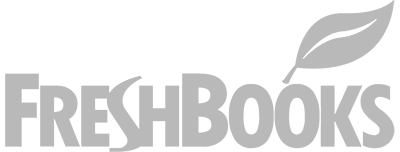His review sites made it on the Financial Times’ 1,000 fastest-growing businesses in Europe for 2022.
With just 6 employees, he recorded annual revenues of €3,646,507 (or ~$3.8M USD). That was up 361% from just three years prior.
When I saw he was already following me on Twitter, I knew I had to reach out and see if he was willing to answer some questions about his success.
After a few weeks of discussing his story, I’m very excited to share more about a network you may have already seen in search results.
In this brand new interview you’ll learn:
- Why they risked rebranding and redirecting their main review site
- Exactly how much the new domain they redirected to cost them
- How concerned he is about Google algorithm changes
- His thoughts on actively link building
- Whether he recommends building out sites in other languages
- His advice for others building out review sites
And lots more.
I think you’ll get a lot of value from this one but first, the website…
Meet Tooltester.com, The Service Review Site I Almost Thought Was a SaaS Company
Something I’ve preached for years in private training and semi-viral Twitter threads is once you’ve taken care of the SEO fundamentals, spend time trying to differentiate your brand in your space.
Tooltester, founded by Robert Brandl, primarily reviews website builders (like Wix, and Squarespace), Hosting companies (like Namecheap and Kinsta) and eCommerce platforms (like Shopify and WooCommerce).
That’s not unique. You’ll find hundreds if not thousands of reviews for anything he and his team cover.
What is unique though (at least to me), is that Tooltester differentiates itself with design in a big way.
Let’s start with the website header, which doesn’t look like your standard review site homepage (often just a list of links in a typical blog format).
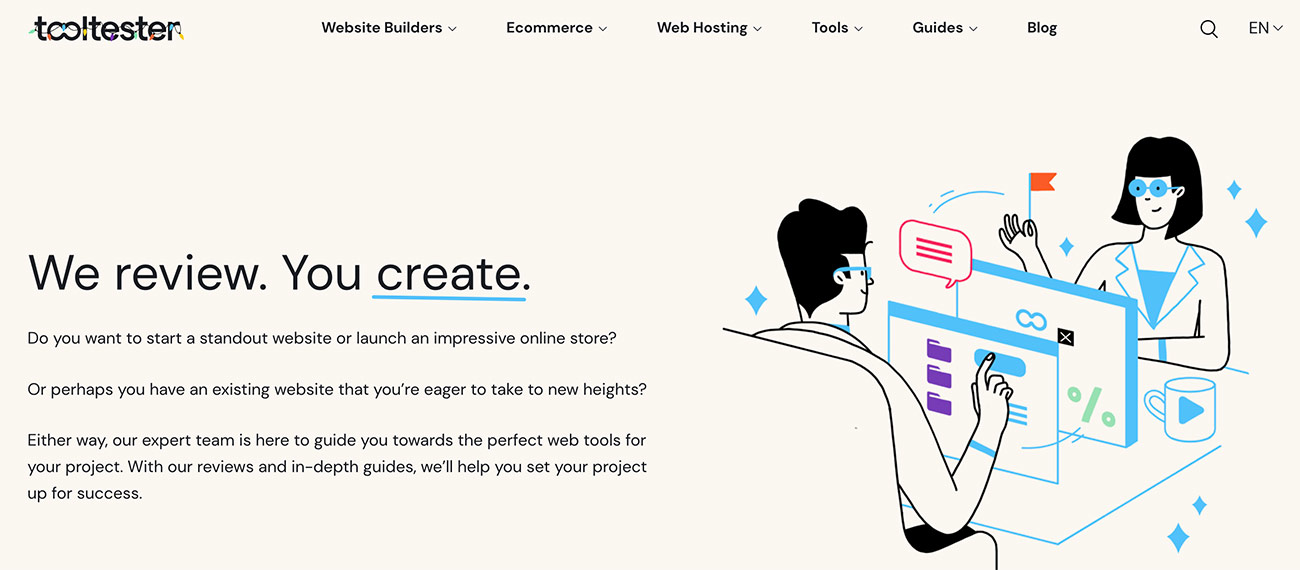
I love that they care about the details (no pun intended) by changing their logo for different yearly events.
Scrolling down it’s very clear to see who is actually behind the brand and what they’re publishing.

While this is becoming more popular, it won’t take you many “best X” searches to see sites which use AI-generated or stock photo profile pictures.
Then there’s the feedback area, which again is styled in a way you would expect for the homepage of a software-as-a-service company rather than a service review affiliate.

Of course, the homepage is only part of it.
Individual review pages and the affiliate links they contain are where the money is made, so here’s a little breakdown of what I think are some really smart elements.
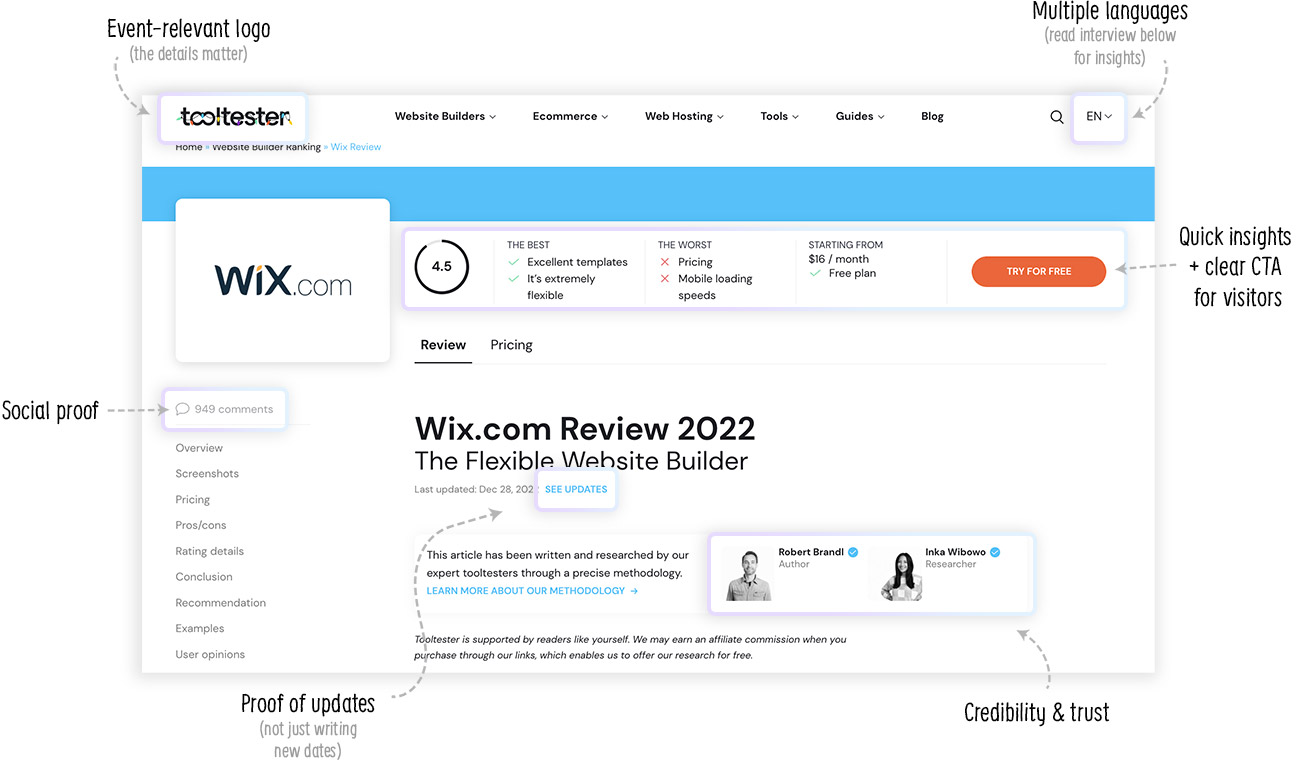
This of course isn’t to say that the design of Tooltester and its smart UI elements are the only reason it has been successful.
Link building, great rankings, website copy, keyword research and more have all played a huge part.
I just think it will continue to matter more than ever that when people click on your site in search results they aren’t left thinking, “How is this site even ranking?“, and a focus on design certainly helps with that.
It’s nice to showcase a success story where the owner cares about the little details of what he’s creating.
12 Questions with Tooltester Founder, Robert Brandl
Q
Robert, I really appreciate your openness in sharing more about your success story, so let’s begin with that. How did you get started online?
Before I started Tooltester I was working for an online marketing agency back in Frankfurt, Germany. My specialization was email marketing, which helped a lot in building out EmailToolTester.com, which focuses on reviews for newsletter services. I guess you could say that the practical experience of having worked with email marketing clients was my unfair advantage.
In this role as an international project manager, I also learnt lots about internationalisation processes that I applied to my websites (which I will talk more about later).
Tooltester was born as a side hustle in 2009. Initially, I just wanted an easy way to build a website and came across website builders like Wix and Squarespace that were born during that time. (Un)fortunately, there wasn’t much information about them available yet, which led me to start reviewing them.
The goal was just to replace the income from my day job, so I could work from anywhere and travel. While I did travel a little, I quickly decided that Barcelona is the place where I want to live. That’s where I now have my office and company with its 10 employees.
Q
Last year you rebranded from WebsiteToolTester.com to Tooltester.com. What was the reasoning behind that? Was that so you could branch out into other areas from a branding perspective, or was there more to it?
Great question!
The idea was born in 2019 when we were growing nicely but constantly seemed to hit a ceiling in our Google rankings. It was usually larger brands who were outranking us for profitable search terms (PCMag, CNET etc.).

That’s when I presented the idea to our team to merge all of our sites into one and do a complete rebranding (back then we also had another website called ChatToolTester, reviewing live chat tools). Not all the team members were immediately convinced, I have to say, but after discussing the plan in more detail the team was fully on board eventually.
Part of the project was acquiring the domain Tooltester.com, which set us back about $20K.
Not cheap, but comparing it to somewhat similar domain names, I found it reasonable in the end. The only thing about the purchase that annoyed me a lot was that the seller wasn’t willing to negotiate even 1 cent. And I tried to bargain very hard 😆
Q
Tooltester has been around for over a decade now. Has both your traffic and financial success been fairly linear, or have some years been much better than others?
Our growth was very slow in the beginning, mainly because I was working on it by myself until 2013.
Once I finally hired employees, growth accelerated more and more. We got much better at SEO and managed to scale our content internationally while there was still relatively little competition around.
When COVID hit, our growth absolutely shot through the roof. Revenues doubled in 2020 compared to 2019.

After the lockdowns were a thing of the past, we weren’t seeing the same dynamic anymore. While our revenue in 2021 was still higher compared to 2019, we didn’t reach the same sales volume as during the height of the pandemic.
People didn’t spend quite as much time online anymore and pretty powerful competitors entered the market (e.g. Forbes).
My impression is also that because of the E-A-T factors kicking in, a strong domain name is now much more important than ever before. For some keywords we are seeing lots of high-DR websites outranking us with relatively poor content and expertise (yes, Forbes Advisor, I am talking about you!). Nerdwallet is another example.
Essentially, I’m talking about sites that have no real business in our niche other than it being very easy for them to rank because of their strong domains.
I was a little bit surprised by the effect of the domain change on our rankings, which we carried out in September 2021. My thinking was that we’ll go down in the rankings for about 3 months and then quickly recover. This also happened as expected, but since then, our rankings have been somewhat unstable – even though we did everything by the book regarding 301 redirects etc.
The interesting thing is that we still have EmailToolTester, which serves as our control group. There we have the same content and SEO processes as for Tooltester, but the ranking evolution has been much more steady.
Therefore, here’s my advice: Only ever change your domain name if you absolutely must!
Q
Some great rankings are obviously a big part of Tooltester’s success. How concerned are you during Google updates, and is there anything you do to try and keep your brands “safer” from Google’s wrath?
For years, Google updates have only ever been a good thing for our website. But recently, we see a lot of volatility in the SERPs, which can be quite stressful. I guess Google is still trying to figure out how to find the right balance between content quality and domain authority.
For SEO-based websites, it’s extremely difficult to get more independent of Google. Going into paid ads, for example, is a very different kind of business that requires skills you don’t naturally have as an SEO.
What generally works best is YouTube, where we now have 6.5M views and 27k subscribers. Of course, it’s not true independence from Google, but it does have a life of its own and integrates well with our SEO and branding efforts.
Q
At first glance, Tooltester looks more like a SaaS company than a service review site. It’s certainly not your “typical affiliate site”. How important do you think design and branding are to your success?
As you already mentioned, we completely rebranded the website in August 2022. This whole process took nearly 1.5 years to complete. Branding was one of the main objectives related to our name change. We wanted to look more like an authority. Not like the two-person website we were before, but much more like a SaaS company as you said.
We’ve only been using the new design for a short time but my impression is that we’ve received backlinks and appeared on the radar of people who previously would not have seen us as a relevant player.
I think there is a lot of truth to what you’re saying about getting the finer details right.
An important SEO side-note: We were very deliberate about not changing the domain name and launching the new design at the same time. This is usually one of the worst mistakes companies make when doing relaunches, as it makes it very difficult to analyse the factors that led to a decline or increase in Google rankings.
Q
From your about page it’s clear there are quite a few people working for your sites, and I saw some office photos on Twitter as well. Does your team primarily work together in-house, or remotely? And do you need help from contractors time-to-time?
About half the team works on-site in our spacious Barcelona office. I quite like having the team in one place because so many ideas come to light if you put smart people in one room.

Of course, the ones living outside of Barcelona don’t come in every day, but naturally remote work is highly compatible with our type of business.
We also work with external writers, designers and translators.
Q
You rank for some very competitive keyphrases, no doubt helped by great backlinks from the likes of Adobe, Cnet, HubSpot and The Guardian newspaper. What is your approach to link building? Is it something you actively look to work on or do you let links come in passively?
We do get a decent amount of links naturally but just like our competitors, we need to actively work on getting additional ones. For example, we run digital PR campaigns and also do occasional guest posting.
A passive link-building strategy that works well for us is statistics and market research-type of content like this piece on website load times (which you’re also describing in SEO Blueprint).
This gets linked naturally by websites that are looking for this type of data.
Q
Both Tooltester and EmailToolTester are produced in multiple languages. Is this something you would recommend others do? Is it an expense that has paid off?
Being German myself, it was natural to also offer the content to German-speaking readers. And because of my experience with localisation processes, it was easy for me to produce the content in different languages.
English is still by far the biggest and most profitable language, but I wouldn’t underestimate non-English markets. There is a lot of potential in terms of search volumes and in many cases, it’s easier to rank for interesting keywords there.
Whether it has paid off or not? We wouldn’t be doing it if it wasn’t profitable 🙂.
Q
How much of your content focus is “A lot of people are searching for this, let’s review some products there” compared to “I think it would be cool to share insights on this product/service, even if it’s not that popular”. Is it one or the other, or a mix of the two?
I’d be lying if I claimed that our content plan isn’t guided by keyword search volume. It just makes a lot of sense to review brands that are already popular in the marketplace and attract interest.
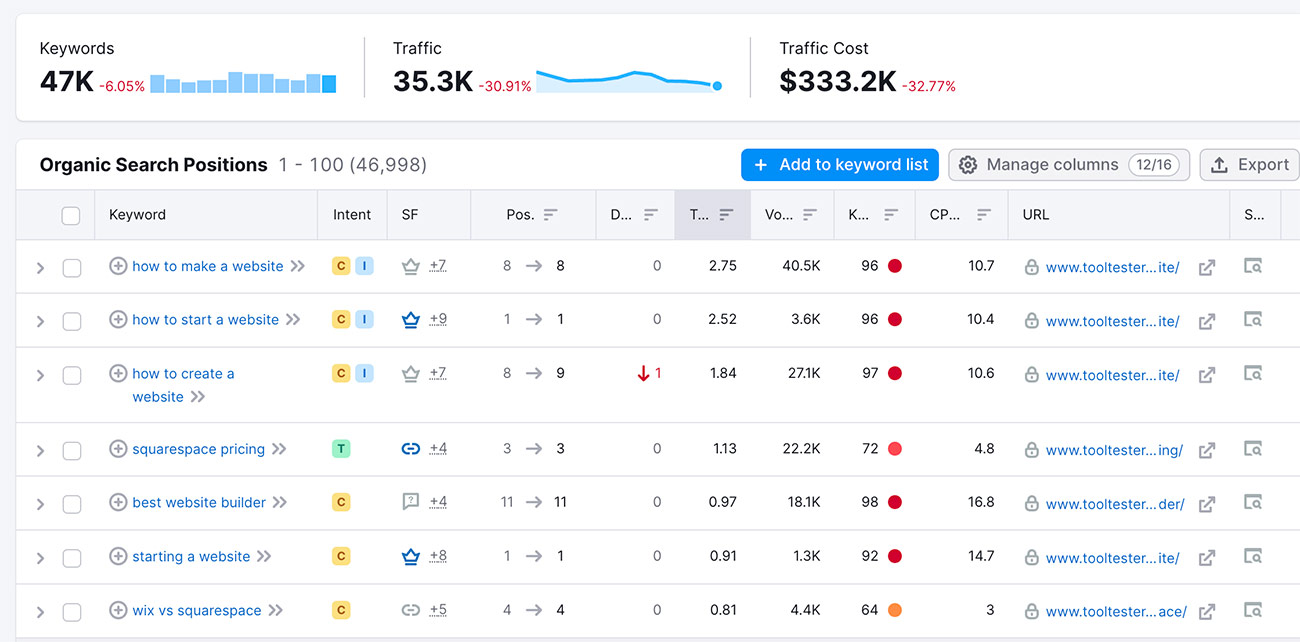
In the early days we sometimes reviewed beta versions of upcoming new software, but we had to realise that usually there wasn’t much demand from our readers for these types of reviews and quite often it also happened that these companies shut down their products.
What we do try, though, is to spot up-and-coming products that may not yet have high search volume but have potential to rise.
Q
You produce a lot of content on YouTube. This is a two-part question: A) Do you know how that has affected overall revenue (such as affiliate links in descriptions or video mentions)? and B) Besides being more valuable for visitors, do you believe there’s direct SEO value in embedding the videos on your pages?
While I don’t know the exact share of revenue our YouTube videos add to our sales, there are certainly sales coming from people clicking the affiliate links in the YouTube description (it’s a relatively small share but not to disregard either).
Regarding the SEO value of videos, it’s difficult to say. Usually the ranking for one of our reviews doesn’t shoot up because we added a video. Links seem to have a stronger effect in that respect. However, for certain keywords in our niche (e.g. xyz review), it’s impossible to rank in the top 3 if you don’t have any video on your page.
I guess the strongest SEO effect coming from a video is that people spend more time on a page, which gives a positive signal to Google.
Q
Lots of people reading this will be in a situation where they’re trying to grow their own ‘review’ rankings in Google. Whether that’s for physical products or digital items. What advice would you have for them, especially in competitive niches?
It’s pretty clear now that you have to actually test the product you are reviewing. It’s too easy for your readers as well as Google to figure out when all you do is recite product features and rely on images that were supplied by the manufacturer.
We also see a strong correlation between a long and detailed review with its ranking. Essentially, the lower your Domain Rating, the more effort you have to invest in your content, and that usually means creating extremely long and detailed articles – but make sure they are still relatively easy to navigate!
Q
You’ve been working on your sites for over a decade and just recently received the accolade of building one of Europe’s fastest-growing companies. It’s super inspiring. Congratulations! What’s next for Robert Brandl? More sites? Focus on existing properties? Sell and kick your feet up?
The thing I love about running this business is that my role changes so frequently. Coming from a position where I was the only content producer, I now run a team of international content managers. My current challenge is branding. I want to make Tooltester stand out among its competitors and I am really enjoying this task.
I do also enjoy writing on my personal blog from time to time, feel free to check it out at robertbrandl.com.
Thanks so much for your time, Robert!
Just a couple of notes from Glen:
- Any highlighted text in Robert’s answers were my own emphasis
- A few questions were modified very slightly from the original interview to help with ‘flow’, but the context was the same
Product Review Sites Can Be Insanely Profitable, But…
…if you’re relying on Google rankings for a significant portion of your traffic and revenue, there is a chance that traffic can be cut off or massively reduced overnight.
The highs can be very high, and the lows can be very low.
I’m sharing Robert’s story as I love what he’s done with the site and I hope people find it inspiring, but I should also be responsible and warn beginners that there’s typically a lot of work involved to make money in this space.
And despite how hard you work, there are no guarantees you’ll continue to grow.
My friend Luke is building out his gaming niche site, Diamond Lobby, which had its best ever year in 2022.
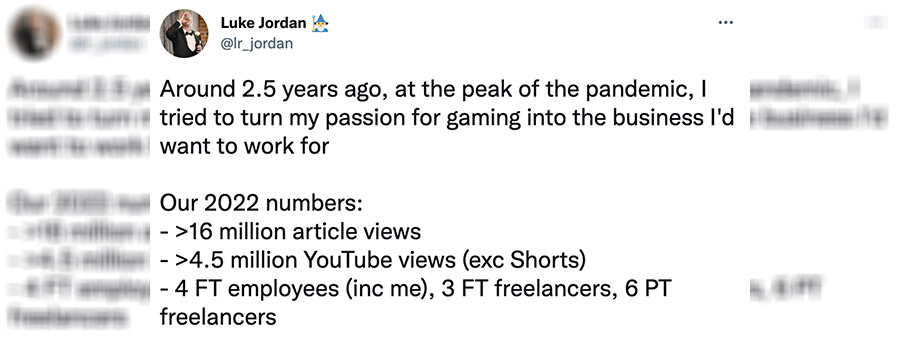
Then, just a week later, he shared there are new challenges he has to overcome.
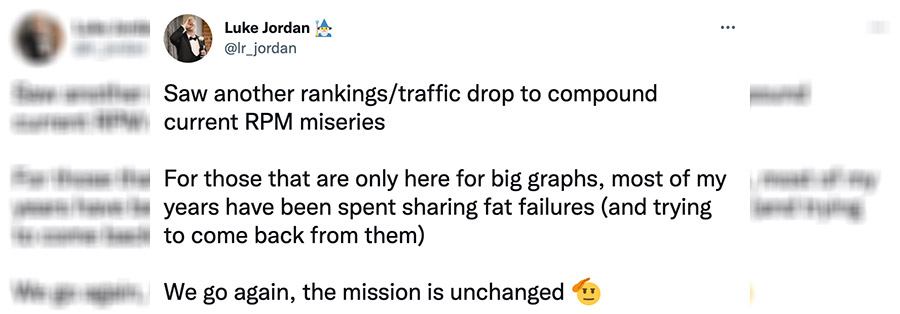
(My understanding is he makes more revenue from display advertising than affiliate links, but definitely utilises the latter).
One of the reasons I follow Luke is because of his attitude in that last sentence. It’s a similar attitude you’ll need yourself.
Of course, there are no business models without some kind of risk — I just didn’t want to paint this as some kind of get-rich-quick angle.
Affiliate Marketing Insights After Studying Thousands of SERPs
A couple of years ago I went live with a research report where we invested thousands of dollars and analysed more than 1,000 affiliate search results.
Our aim with the study was simple: To see whether smaller, niche affiliate sites still had a chance of ranking against the Business Insider and Forbes’ of the web.
While there is a lot to the post, we found that niche affiliate sites (e.g. gadget reviews) and hyperniche affiliate sites (e.g. just printer reviews) took more top spots than general affiliate sites that cover a lot of topics.
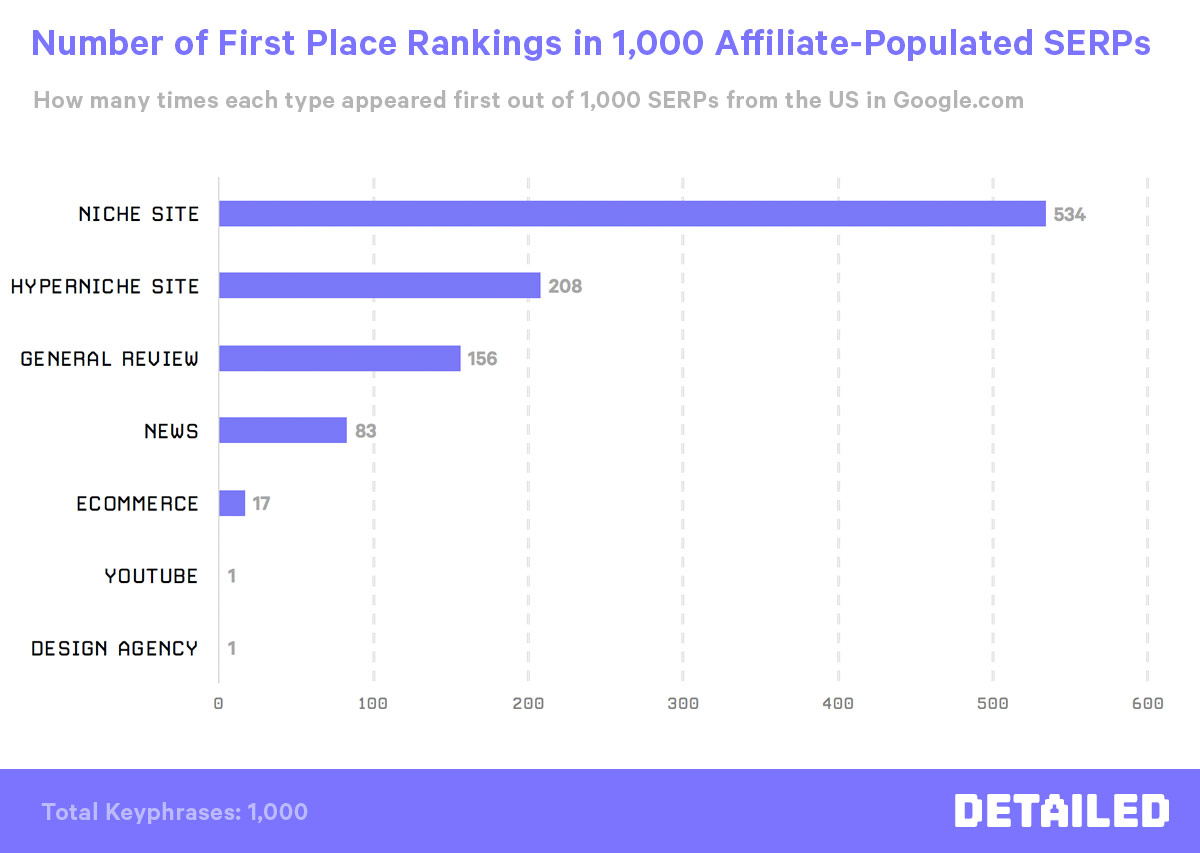
18 months later, I decided to do the research again.
This time we looked at more search results (literally 10X) and invested significantly more money. You can read this Twitter thread about all of our findings, but once again found that niche sites ranked well.
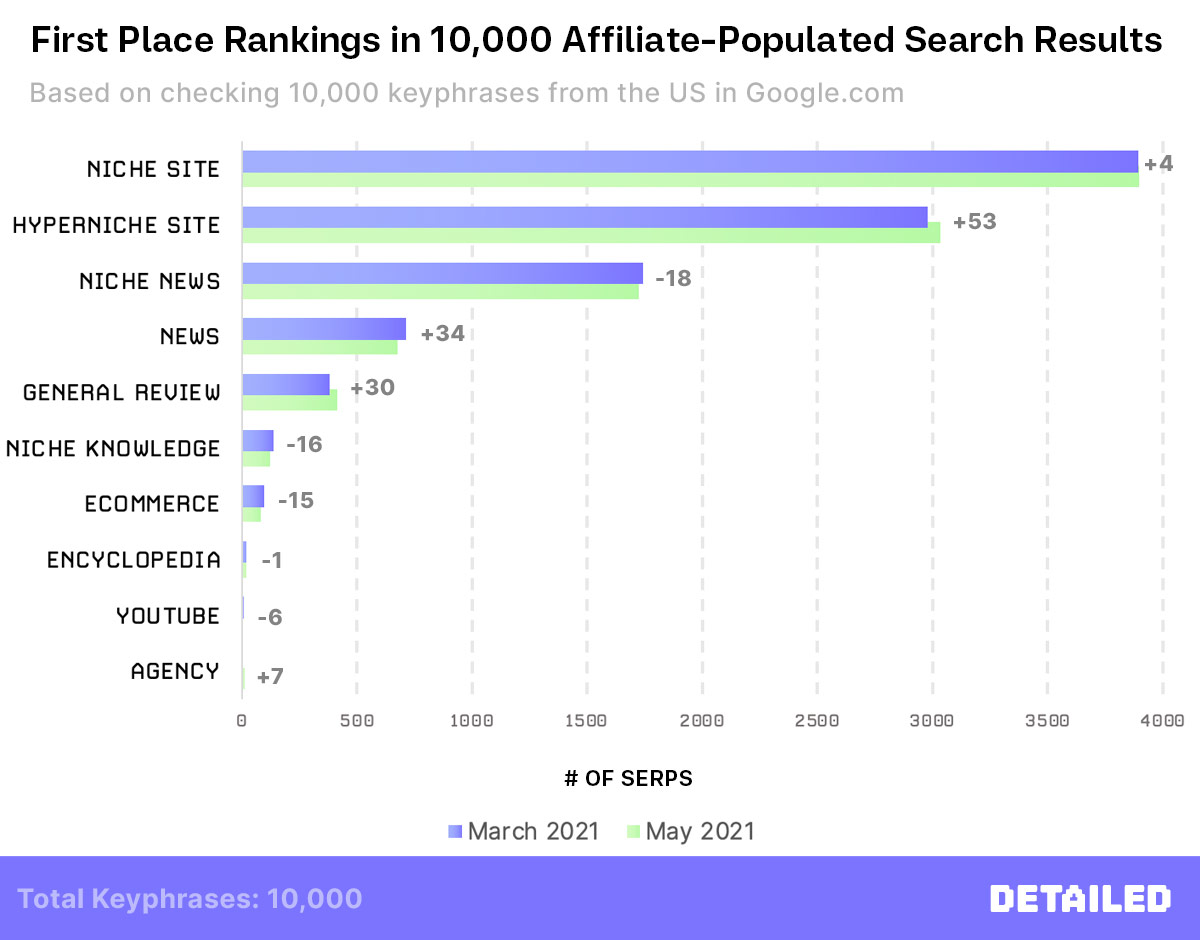
In other words, you probably stand a better chance of ranking, and ranking highly, if you have a more niche-specific site than a general one that covers lots of topics.
That might not be much of a surprise, but there were a lot more insights I shared.
So where am I going with this?
In a few weeks we’ll be going live with the 2023 version of this report, and it’s going to be our most insightful yet.
If you don’t want to miss it, I recommend putting your email address in one of the two forms below. I will never spam you, and of course you can unsubscribe every time.
Thank you for being here.
I really hope you enjoyed this one!

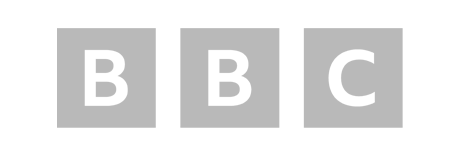









 568
568 
 is our own fully fledged SEO framework and private community focused on taking search engine rankings to the next level.
is our own fully fledged SEO framework and private community focused on taking search engine rankings to the next level.

